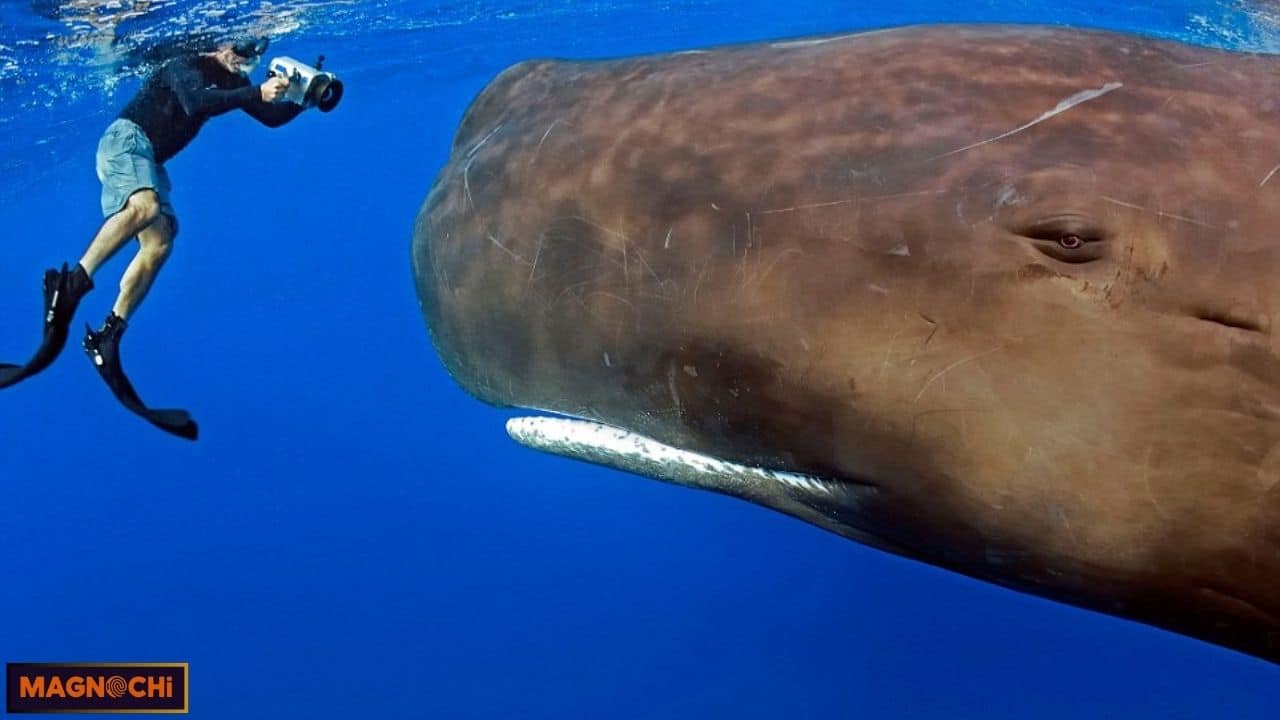Do Sperm Whales Attack Humans? Sperm whales (Physeter macrocephalus) are some of the most remarkable creatures on the planet. As the largest of the toothed whales, they represent a key piece of marine biodiversity.
With their massive size, complex social structure, and sophisticated hunting techniques, they capture the imagination of people all around the world. But one of the most common questions that people ask about sperm whales is whether they attack humans.
While this question is often rooted in misconceptions, particularly popularized by fictional portrayals, the truth is far more fascinating and nuanced.
This post will dive deep into the world of sperm whales, examining their behavior, the history of human-whale interactions, and how modern science and marine biology have changed the way we understand these creatures.
By the end, you’ll have a clear understanding of whether sperm whales are truly dangerous to humans or just misunderstood.
What Are Sperm Whales?
The Giants of the Ocean
Sperm whales are the largest toothed whales in the world, and second only to the blue whale in overall size. Adult male sperm whales can grow up to 60 feet in length and weigh an astonishing 57 tons.
Females are smaller, measuring up to 40 feet and weighing approximately 15 tons. Their most striking feature is their massive head, which makes up almost a third of their total body length. Inside this large head is the whale’s highly evolved brain, which is the largest brain of any animal, weighing up to 17 pounds.
Sperm whales are found in oceans around the world, migrating between tropical and polar waters depending on the season. They are deep-diving animals, regularly plunging to depths of 3,000 meters (around 10,000 feet) to hunt for their primary prey: giant squid, colossal squid, and other deep-sea creatures.
Their ability to navigate the darkest depths of the ocean is aided by their advanced echolocation, a form of sonar that allows them to “see” in the pitch-black waters below. [Do Sperm Whales Attack Humans?]
Physical Characteristics
- Size: Up to 60 feet long (males), 40 feet long (females)
- Weight: Males can weigh up to 57 tons, females up to 15 tons
- Head: Accounts for about 1/3 of their body length, contains their massive brain
- Teeth: Sperm whales have large, conical teeth up to 26 teeth on each side of their upper jaw, which help them catch their prey.
These creatures are also known for their social behavior and the complex social structures within their pods. Females and younger whales form groups, while adult males tend to be more solitary, often traveling alone or in small groups.
This social structure plays a significant role in their overall behavior and interactions with both other marine life and humans.
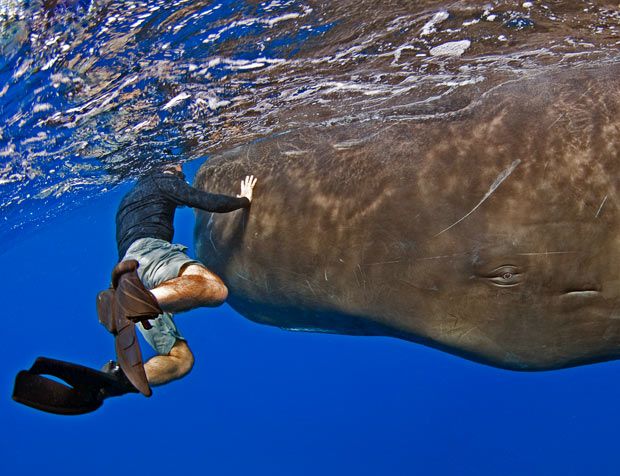
Do Sperm Whales Attack Humans?
Natural Behavior Towards Humans: A Non-Aggressive Species
Sperm whales, like most marine creatures, do not seek out conflict with humans. Their natural behavior towards humans is typically non-aggressive. [Do Sperm Whales Attack Humans?]
While their size and strength could cause harm if they collided with a person, it’s important to understand that sperm whales do not actively target humans as prey.
Curiosity Over Aggression
One of the defining characteristics of sperm whales is their curiosity. When humans venture into their domain especially divers and researchers sperm whales often show interest, approaching cautiously to investigate.
They do not act aggressively, but instead, they seem more intrigued by the human presence. In fact, sperm whales have been known to approach research vessels or divers, sometimes lingering in the area for extended periods, seemingly observing and interacting without displaying signs of aggression.
Aggression: Self-Defense, Not Malice
Sperm whales may become aggressive if they perceive a threat, but this aggression is typically a defensive response rather than an attack.
Like many animals, sperm whales will defend themselves or their pods when they feel cornered, threatened, or provoked. In these cases, the whale’s aggression is a self-defense mechanism rather than an act of malice.
Their tail slapping is one of the most common defensive behaviors, where they use their massive tails to defend themselves from perceived threats.
Common Defensive Behaviors
- Tail Slapping: A powerful and dramatic movement designed to ward off threats.
- Vocalizations: Sperm whales use clicks and other sounds to communicate within their pods and to establish territory. These sounds can also serve as warnings.
- Charging: In rare instances, a sperm whale may charge at an intruder, such as a boat or a human, if it feels threatened.
Despite these defensive behaviors, sperm whales rarely attack unless provoked or cornered. The idea that they actively seek to harm humans is a misconception fueled by sensational stories and fictional depictions in movies and books.
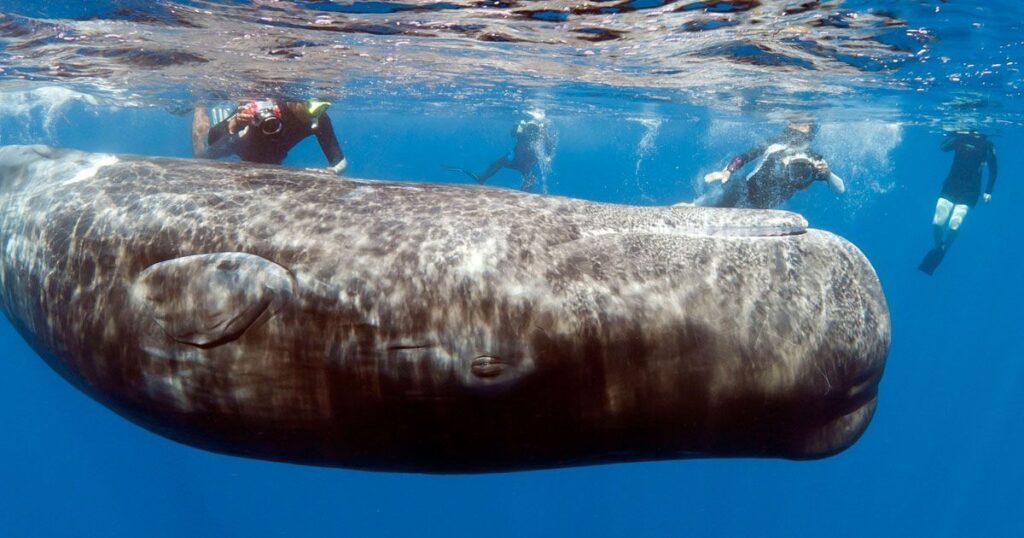
Historical Encounters with Sperm Whales
Whaling History and Misunderstood Aggression
The relationship between sperm whales and humans has been long marked by conflict, particularly during the height of whaling in the 19th century.
Whalers hunted sperm whales for their valuable oil, used in lamps and as industrial lubricants, and their spermaceti, a waxy substance found in their heads that was highly prized for use in cosmetics and candles. [Do Sperm Whales Attack Humans?]
During this time, whaling ships often came into direct conflict with sperm whales. The most famous of these confrontations is the Essex Incident (1820), in which a sperm whale attacked a whaling ship, sinking it and leading to the death of several crew members.
This incident has been immortalized in Herman Melville’s Moby Dick, which painted a dramatic and vengeful portrait of a sperm whale seeking retribution against humans.
The Essex Incident (1820)
The tale of the Essex is one of the most famous examples of a sperm whale attacking a ship. The ship was struck by a male sperm whale, which was likely defending itself after being harpooned.
The whale’s action was not a calculated attack on humans, but rather a reaction to being wounded. This tragic event led to the sinking of the ship and the survival struggle of the crew, but it is often misinterpreted as a deliberate act of aggression by the whale.
While the Essex Incident and similar events in whaling history were undoubtedly traumatic, they represent specific cases of conflict between humans and sperm whales, rather than the typical behavior of these animals.
Sperm Whales in Fiction and Popular Culture
Fictional portrayals, like that in Moby Dick, have significantly influenced how people view sperm whales.
The idea of a vengeful whale, like the white whale in Melville’s novel, has persisted in modern media, including movies and documentaries. However, such portrayals are dramatizations that do not reflect the true nature of sperm whales.
The popularization of the Moby Dick myth has created a lasting misconception that sperm whales are inherently hostile toward humans.
In reality, sperm whales are not driven by the emotions of vengeance or malice they are simply reacting to environmental stimuli, such as perceived threats or injury.
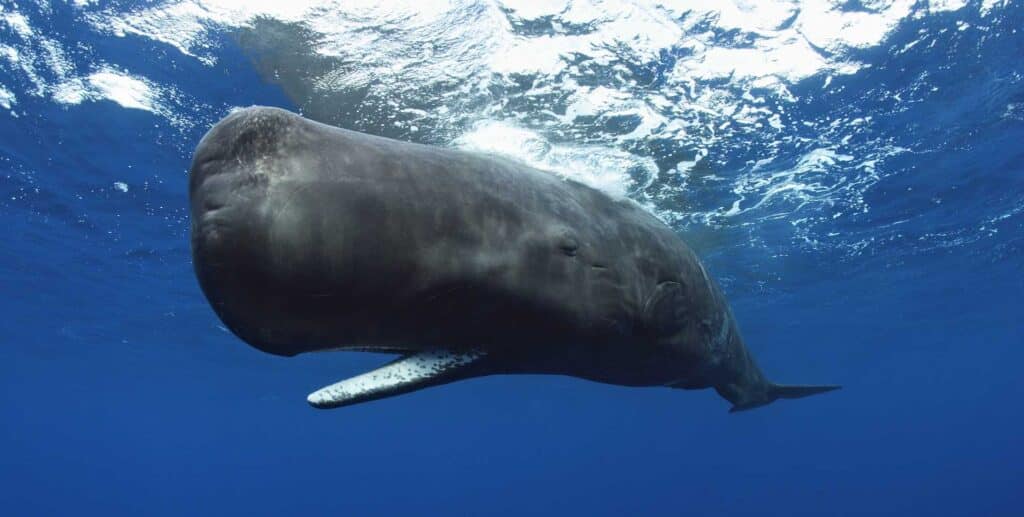
Sperm Whale Aggression: More Likely to Be Misunderstood
Self-Defense and Protective Behavior
While sperm whales are not naturally aggressive toward humans, their defensive instincts can be triggered in certain situations. [Do Sperm Whales Attack Humans?]
If a sperm whale feels threatened especially when it is accompanied by a calf it may display aggressive behaviors as a way to protect itself or its pod. In these cases, the whale is likely acting out of self-preservation rather than hostility.
Defense Mechanisms
- Tail Slaps: A primary defense mechanism to deter threats.
- Vocalizations: Used to communicate danger or warn others.
- Chasing or Charging: A rare but possible response if the whale feels cornered or harassed.
A More Cautious Approach
Most of the time, sperm whales are peaceful and non-aggressive. Their natural inclination is to avoid conflict, and they will often swim away from human interactions rather than engaging in hostile behavior.
If a sperm whale feels that its personal space is being invaded, it will usually seek to distance itself. This behavior shows their preference for non-confrontational interactions with humans.
Interactions with Divers and Researchers
Curiosity or Aggression? What Marine Biologists Say
Marine biologists who study sperm whales note that these animals are incredibly curious. When divers or researchers enter their environment, sperm whales often approach them with interest.
In some cases, the whales may even interact playfully with researchers, though the behaviors are generally non-aggressive.
However, researchers caution against getting too close to these creatures, as their immense size and strength can still pose a danger if they feel threatened or disoriented.
Many marine biologists who work with sperm whales emphasize the importance of maintaining a safe distance. This distance is typically around 100 yards for whale watchers, though divers may need to adjust based on the whale’s behavior.
Scientific Observation and Peaceful Encounters
In areas like the Azores, which are known for sperm whale watching, divers have experienced close encounters with these whales without any aggression.
Researchers have documented peaceful interactions where sperm whales approach divers without signs of hostility. [Do Sperm Whales Attack Humans?]
The key to these interactions is patience, respect, and understanding the whale’s behavior.
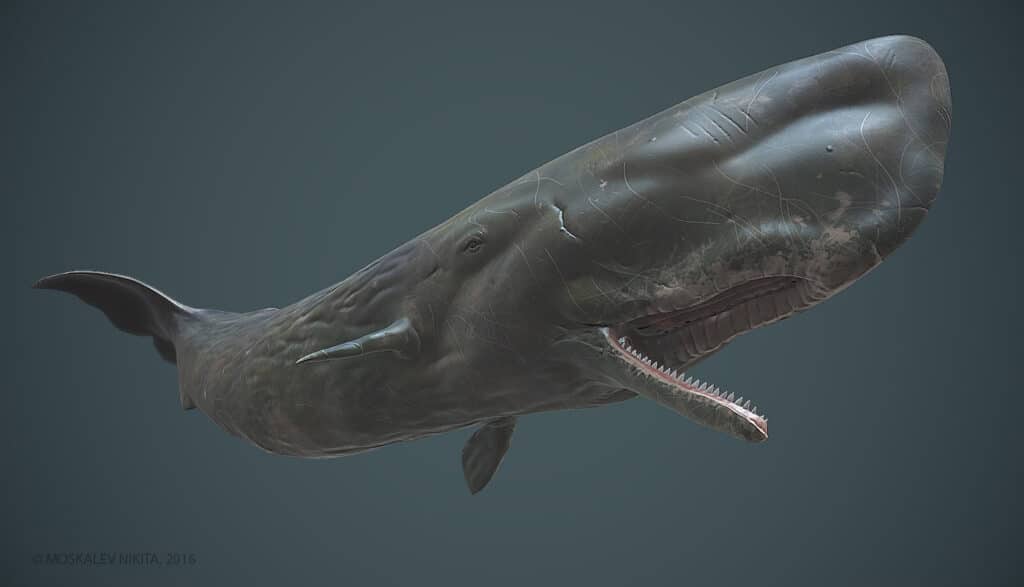
Are Sperm Whale Encounters Dangerous?
Are Sperm Whales Dangerous to Humans?
While sperm whales are certainly capable of causing injury due to their size and strength, there is no evidence to suggest that they actively seek out humans
to harm. The risk of an accidental encounter that leads to injury is low, and most of these incidents can be avoided with proper precautionary measures.
The risk comes not from the whale’s intent, but from its massive size and the potential for unintentional collisions. [Do Sperm Whales Attack Humans?]
Risk Factors: What to Know About Sperm Whale Behavior
Sperm whales are powerful and large animals, and they can inadvertently cause harm if they are startled or feel threatened.
Most incidents involving sperm whales and humans happen when boats or divers get too close, potentially startling the whale or blocking its path.
How to Safely Interact with Sperm Whales
Guidelines for Whale Watching and Diving with Sperm Whales
If you are planning to encounter sperm whales in the wild, there are a few important guidelines to follow:
- Maintain a Safe Distance: Always stay at least 100 yards away from the whale. This gives the whale plenty of space to move around without feeling cornered.
- Don’t Approach Calves: Female sperm whales are very protective of their young. Approach a pod with caution and respect the whale’s territory.
- No Sudden Movements: When interacting with sperm whales, avoid sudden or erratic movements that might startle them.
- Respect Marine Wildlife Regulations: Follow the local regulations for whale watching, which are designed to protect both you and the whales.
Final Verdict
The idea that sperm whales attack humans is rooted more in myth and fiction than in reality. These animals are not inherently hostile and generally prefer to avoid interactions with humans.
Most aggressive behavior displayed by sperm whales is a form of self-defense in response to threats or perceived danger. [Do Sperm Whales Attack Humans?]
They are not driven by malice or vengeance, but rather by instinctual behaviors aimed at protecting themselves or their pod.
By respecting sperm whales’ space, understanding their behavior, and following marine safety protocols, humans can safely share the oceans with these magnificent creatures.
FAQs
Can sperm whales harm humans?
Sperm whales are not naturally dangerous to humans. While their size and power could cause injury in an accident, they don’t seek to harm humans. Most interactions are peaceful and based on curiosity.
How aggressive are sperm whales?
Sperm whales are generally non-aggressive. They may show defensive behaviors if threatened, but they aren’t naturally hostile. Aggression is usually a response to perceived danger, not an attack on humans.
Has there ever been a sperm whale attack?
There are no verified cases of sperm whales intentionally attacking humans. Some historical incidents, like the Essex Incident, were defensive reactions to whaling ships, not attacks on people.
Do sperm whales bite?
Sperm whales have teeth, but they don’t typically bite humans. They use their teeth to catch prey, mainly giant squid. Biting behavior directed at humans is not common.
Is it safe to swim next to a sperm whale?
Swimming next to a sperm whale is generally safe if done from a respectful distance. Whales are curious but should not be approached too closely, as they might feel threatened. Always follow local safety guidelines.
Can humans survive inside a sperm whale?
No, it is not possible for humans to survive inside a sperm whale. These creatures have extremely strong digestive systems, and the idea of being swallowed by a whale is purely fictional.
What are the most aggressive whales?
Orcas, also known as killer whales, are generally considered more aggressive than sperm whales. They are apex predators and have been known to hunt in groups, attacking other marine mammals.
Do sperm whales eat sharks?
Sperm whales mainly hunt giant squid but can occasionally eat sharks, particularly when prey is scarce. Their deep-diving abilities allow them to catch large prey like sharks or rays in the ocean’s depths.
Conclusion
Sperm whales are not the dangerous, vengeful creatures often portrayed in fiction. These majestic beings are mostly non-aggressive and prefer to avoid humans rather than engage in conflict.
While their size and defensive behaviors can be intimidating, any aggressive actions are typically rooted in self-defense or provoked by human interference.
By understanding their natural behavior and respecting their space, we can safely coexist with sperm whales.
Maintaining a safe distance and adhering to marine guidelines ensures that humans can appreciate these incredible creatures without risking harm to themselves or the whales. Ultimately, sperm whales deserve our respect and protection, not fear. [Do Sperm Whales Attack Humans?]
Read more knowledgeable blogs on Magnochi
